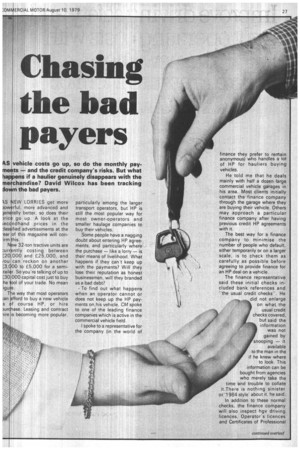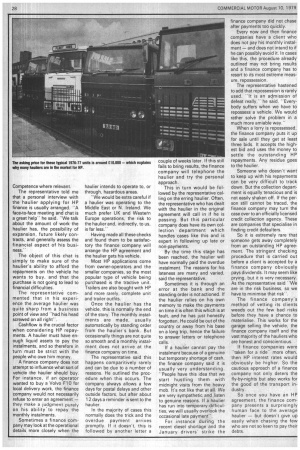Chasing the bad payers
Page 29

Page 30

If you've noticed an error in this article please click here to report it so we can fix it.
AS vehicle costs go up, so do the monthly payments — and the credit company's risks. But what Nappens if a haulier genuinely disappears with the merchandise? David Wilcox has been tracking down the bad payers.
siS NEW LORRIES get more )owerful, more advanced and jenerally better, so does their )rice go up. A look at the >eccndhand prices in the :lassifted advertisements at the 'ear of this magazine will con'irm this.
New 32-ton tractive units are ;urrently costing between :20,000 and £25,000, and rou can reckon on another :3,000 to £5,000 for a semirailer. So you're talking of up to :30 000 capital cost just to buy he tool of your trade. No mean igure.
The way that most operators an afford to buy a new vehicle s of course HP, or hire )urchase. Leasing and contract lire is becoming more popular, particularly among the larger transport operators, but HP is still the most popular way for most owner-operators and smaller haulage companies to buy their vehicles.
Some people have a nagging doubt about entering HP agreements, and particularly where the purchase — like a lorry — is their means of livelihood. What happens if they can t keep up with the payments? Will they lose their reputation as honest businessmen, will they branded as a bad debt?
To find out what happens when an operator cannot or does not keep up the HP payments on his vehicle, CM spoke to one of the leading finance companies which is active in the commercial vehicle field.
I spoke to a representative for the company (in the world of finance they prefer to remain anonymous) who handles a lot of HP for hauliers buying vehicles.
He told me that he deals mainly with half a dozen large commercial vehicle garages in his area. Most clients initially contact the finance company through the garage where they are buying their vehicle. Others may approach a particular finance company after having previous credit HP agreements with it.
The best way for a finance company to minimise the number of people who default, either temporarily or on a larger scale, is to check them as carefully as possible before agreeing to provide finance for an HP deal on a vehicle.
The finance representative said these initial checks included bank references and -the usual credit checks". He did not enlarge on what the usual credit checks covered, but said the information was not gained by snooping — it available to the man in the if he knew where to look. This information can be bought from agencies who merely take the time and trouble to collate it.There is nothing sinister or '1984 style' about it, he said In addition to these normal checks, the finance company will also inspect hgv driving licences, Operator's licences and Certificates of Professional
Competence where relevant.
The representative told me that a personal interview with the haulier applying for HP finance is usually arranged. "A face-to-face meeting and chat is a great help" he said. "We talk about the amount of work the haulier has, the possibility of expansion, future likely contracts, and generally assess the financial aspect of his business."' The object of this chat is simply to make sure of the haulier's ability to afford the repayments on the vehicle he wants to buy, and that the purchase is not going to lead to financial difficulties.
The representative commented that in his experience the average haulier was quite sharp from a business point of view and "had his head screwed on all right".
Cashflow is the crucial factor when considering HP repayments. A haulier must have enough liquid assets to pay the instalments, and so therefore in turn must be strict with the people who owe him money.
A finance company does not attempt to influence what sort of vehicle the haulier should buy. For instance, if an operator wanted to buy a Volvo F10 for local delivery work, the finance company would not necessarily refuse to enter an agreement — they make a judgment purely on his ability to repay the monthly instalments.
Sometimes a finance company may look at the operational details more closely when the haulier intends to operate to, or through, hazardous areas.
'We would be extra careful if a haulier was operating to the Middle East or N. Ireland. We much prefer UK and Western Europe operations, the risk to the haulier and, indirectly, to us, is far less.'' Having made all these checks and found them to be satisfactory the finance company will arrange the HP agreement and the haulier gets his vehicle.
Most HP applications come from owner-operators and the smaller companies, so the most popular type of vehicle being purchased is the tractive unit. Trailers are also bought with HP and more rarely. complete unit and trailer outfits.
Once the haulier has the vehicle, this is normally the end of the story. The monthly instalments are made, usually automatically by standing order from the haulier's bank. But occasionally things are not quite so smooth and a monthly instalment does not arrive at the finance company on time.
The representative said this happens comparitively rarely and can be due to a number of reasons. He outlined the procedure when this occurs. The company always allows a few days for postal delays and other outside factors, but after about 12 days a reminder is sent to the haulier.
In the majority of cases this normally does the trick and the overdue payment arrives promptly. If it doesn't, this is followed by another letter a couple of weeks later. If this still fails to bring results, the finance company will telephone the haulier and try the personal approach.
This in turn would be followed by the representative calling on the erring haulier. Often, the representative who has dealt with the haulier in the original agreement will call in if he is passing. But this particular company does have its own collection department which handles cases like this and is expert in following up late or non-payments.
By the time this stage has been reached, the haulier will have normally paid the overdue instalment. The reasons for his lateness are many and varied, said the representative.
Sometimes it is through an error at the bank and the standing order is not actioned. If the haulier relies on his own memory to make the payments on time it is often this which is at fault, and he has just honestly forgotten. He could be out of the country or away from his base on a long trip, hence the failure to answer letters or telephone calls.
If a haulier cannot pay the instalment because of a genuine but temporary shortage of cash, the finance company said it is usually very understanding. "People have this idea that we start hustling them with midnight visits from the heavy mob. Ifs not like that at all. We are very sympathetic and listen to genuine reasons. If a haulier has run into temporary difficulties, we will usually overlook the occasional late payment".
For instance during the recent diesel shortage and the January drivers' strike the finance company did not chase after payments too quickly.
Every now and then finance companies have a client who does not pay his monthly instalment — and does not intend to if he can possibly avoid it. In cases like this, the procedure already outlined may not bring results and a finance company has to resort to its most extreme measure, repossession.
The representative hastened to add that repossession is rarely used. "It is an admission of defeat really,he said. "Everybody suffers when we have to repossess a vehicle. We would rather solve the problem in a much more amiable way."
When a lorry is repossessed, the finance company puts it up for sale until they get at least three bids. It accepts the highest bid and uses the money to settle the outstanding HP repayments. Any residue goes to the haulier.
Someone who doesn't want to keep up with his repayments can be very difficult to track down. But the collection department is equally tenacious and is not easily shaken off_ If the person still cannot be traced, the finance company may turn the case over to an officially licensed credit collection agency. These are companies that specialise in finding credit defaulters.
So it is extremely rare that someone gets away completely from an outstanding HP agreement. The stringent checking procedure that is carried out before a client is accepted by a finance company obviously pays dividends. It may seem like prying, but it is very necessary. As the representative said -We are in the risk business, so we have to minimise that risk".
The finance company's method of vetting its clients weeds out the few bad risks before they have a chance to materialise. This works for the garage selling the vehicle, the finance company itself and the vast majority of the hauliers who are honest and conscientious,
If finance companies were "taken for a ridemore often, then HP interest rates would obviously be higher. So the cautious approach of a finance company not only deters the fly-by-nights but also works for the good of the transport industry.
So once you have an HP agreement, the finance company presents a surprisingly human face to the average haulier — but doesn't give up easily when chasing the few who are not so keen to pay their debts.




































































































